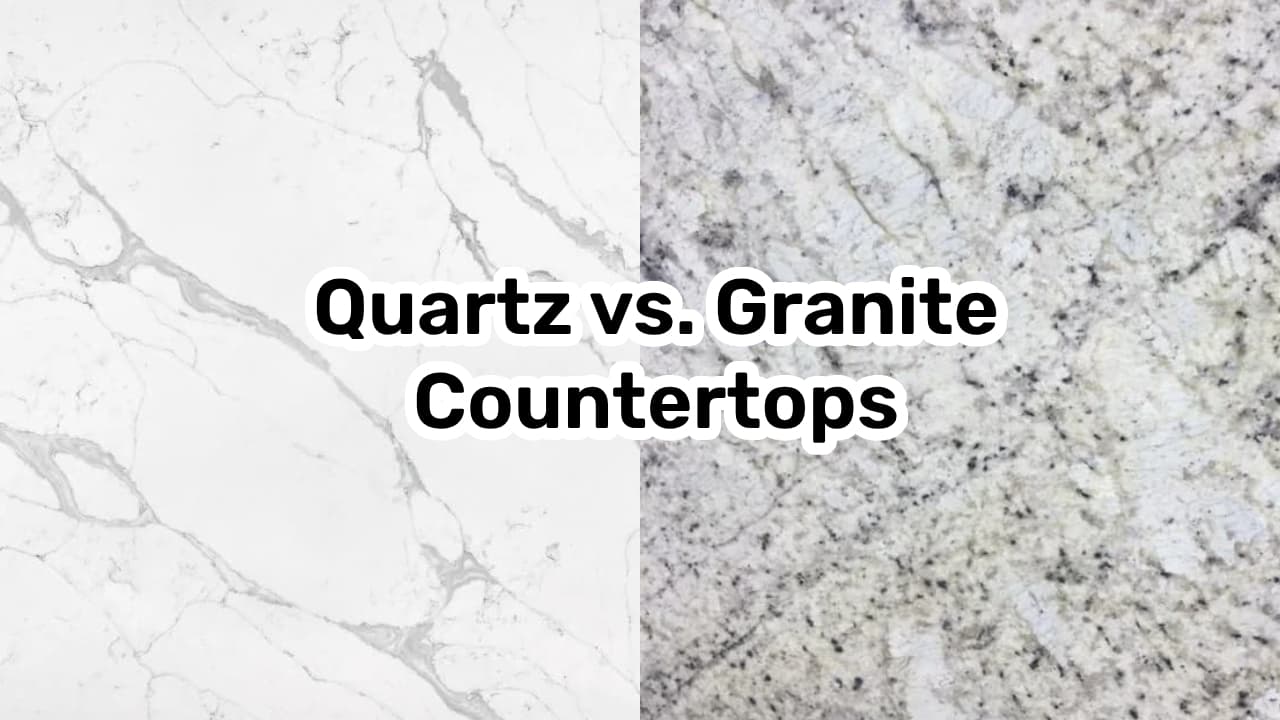Quartz and granite are two of the most popular countertop materials for countertops. Both granite and quartz countertops manage to add beauty and character to your kitchens and bathrooms. Their popularity aside, they both have features that are distinctively different from each other.
Read this guide to learn more about quartz vs. granite countertops to pick the right option for you.
Table of Contents
ToggleWhat are Granite and Quartz?
Granite is an igneous natural stone formed in Earth’s crust. Granite slabs are quarried from various places all around the world. This variety also means granite can come in multiple colors, shades, specks, and unique veining.
Quartz is a manufactured stone engineered to the preferences of the user, allowing them a wide range of colors, patterns, and finishes. Quartz slabs are made by binding crushed quartz particles with polymer resins and pigments, resulting in a durable and beautiful material for countertops.
Differences Between Quartz and Granite Countertops
As you can see, while both materials are famous for countertops and have some similarities, they are pretty different. Let’s take a closer look at these differences.
- Appearance: Granite has been prized for its extreme durability and beautiful looks. The natural veining, patterns, and granite colors make it an ideal choice for countertops. Since granite is a naturally occurring stone, the variety of colors and patterns is finite. However, with so many options, you will find the perfect granite countertops that fit into your home improvement projects.
Quartz, on the other hand, is a manufactured stone that is available in a wide range of colors and patterns. The options are virtually endless when it comes to customizing the looks of quartz countertops. They can even be manufactured to mimic the looks of marble, granite, or solid colors. This versatility makes them easy to be utilized in every interior design style.
- Durability: Granite is an extremely durable yet porous natural stone. Granite countertops are highly resistant to scratches or chipping. However, granite countertops aren’t immune to damage. We highly recommend using cutting boards to protect your countertop’s surface.
Quartz is a strong and resistant material. When it comes to countertops, this feature makes quartz countertops quite valuable for all sorts of applications. The key difference that separates quartz from natural stones is quartz countertops are non-porous. Which means they are easier to maintain and clean.
- Maintenance & Cleaning: Granite countertops require little care and attention to keep their beauty and elegance. They are sealed during installation to prevent liquids from seeping into the pores, which can lead to permanent stains. Regular resealing is required to protect your granite countertops. However, this sealing only gives you time to clean spills before they turn into stains. Cleaning granite countertops is slightly tougher than quartzite countertops since many commercial cleaners can harm marble. You’ll need pH natural cleaners or simply a mixture of dish soap and warm water to clean your marble countertops. Remember to avoid acidic cleaners since they can burn through the sealant and damage the stone. This can cause etching and dulling of the looks of your granite countertops.
Quartz countertops can be considered virtually maintenance-free. Since they are non-porous, they don’t require sealing. Cleaning your quartz countertops are easier than its granite counterparts. You don’t need any type of specialized cleaner for your quartz countertops. Most importantly, you don’t have to stay super vigilant about cleaning spills.
- Heat Resistance: Granite countertops are heat-resistant to some extent because of the way they are formed. However, placing hot pots or pans can lead to discolorations on your countertops.
Quartz countertops are resistant to heat up to 150 degrees. However, that is quite low since most cooking practices can go up to 350. The heat can damage the polymer resins in your quartz countertops, resulting in integrity damage or discolorations. We highly recommend using hot pads or trivets to protect your countertops, regardless of the material.
- Cost: The prices of countertops are affected by several factors. Since granite is a premium material, granite countertops tend to be one of the most expensive in the market.
Quartz countertops are on the affordable side, especially when compared to granite. However, the price can go pretty high with higher-end customized designs.
As you can see, both quartz and granite countertops are quite popular among homeowners and interior designers. Both materials have their unique advantages and disadvantages. If you want to add a touch of nature to your kitchen or bathrooms, granite countertops are an excellent choice, thanks to their natural beauty and extreme durability. On the other hand, quartz countertops are versatile and low-maintenance. Since quartz countertops are manufactured, they can be shaped according to your design preferences.
Ultimately, the choice between these two amazing materials is up to your personal preferences, lifestyle, and budget.
What Else to Know?
Which stone is better, quartz or granite?
Surprisingly, quartz scores higher than granite on Moh’s hardness scale. However, they both are highly durable materials for countertops. The choice is up to your personal preferences.
What are the disadvantages of quartz countertops?
Quartz is a fantastic material for countertops. However, it has some drawbacks as well. First of all, quartz is difficult to install and requires professional installers. Quartz countertops are also vulnerable to heat and can have visible seams.


